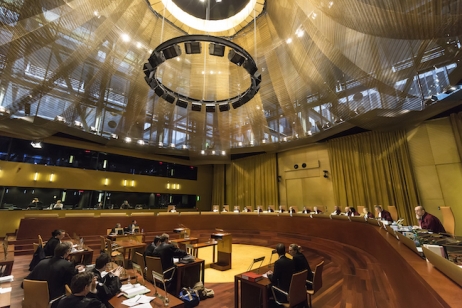
-
The Court decided in 23th of March that it is prohibited to suspend a company's operating license as an administrative measure in parallel with the conduct of a criminal proceeding. It is considered a practice that violates the presumption of innocence, which can decisive affect a business;
-
The decisions of the CJEU are mandatory for all authorities and courts in Romania and have immediate effect, without the need for harmonization at legislative level;
-
The attorneys’ team is composed by Phd. att. Tudor Vidrean-Căpușan (Arad Bar) and Darius Pătrăuș (Cluj Bar), supported by attorney Adrian Șandru (Bucharest Bar) in CJUE proceeding regarding complex issues of European criminal law.
Currently, there are numerous situations in Romania when individuals or companies (especially companies) suffer sanctions by suspending their operating authorization or by ordering other measures that affect their activity for an indefinite period, while they are being investigated for an alleged commission of crimes.
The Court of Justice of the European Union in Luxembourg, an institution that resolves legal disputes between national governments and European institutions, was notified in 2021 in the case of such a situation, in a file concerning a Romanian company active in the field of alcohol production.
The file in brief:
2018: The company was simultaneously subject to a criminal search and a customs control, and following the two investigations, its operating license was suspended for 8 months as the company is subject to an ongoing criminal case.
2020: the company and its representatives acquired the status of defendants, and the authorization was suspended for an indefinite period, until the final completion of the criminal procedure.
2021: The Satu Mare Court - Administrative and Fiscal Litigation Section ordered the referral to the CJEU at the request of the company's attorneys to find out if the presumption of innocence (art. 48 of the EU Charter of Fundamental Rights) allows a person to be subject to sanctions, before his guilt be definitively confirmed by a court decision (a sanction without a defined time limit).
A statement decision requiring rethinking the relation between administrative and criminal sanctions
The Court of Justice of the European Union in Luxembourg confirmed that a person cannot be subject to a criminal sanction that produces fiscal effects with criminal nature, in the absence of a final criminal conviction, especially when the sanction in question is ordered for an indefinite period.
The CJEU reaffirmed through the Decision form March 23 the value and role of the presumption of innocence in a democracy connected to European values.
Through this landmark decision, the Court of Luxembourg expressly mentions that such practice is prohibited, that administrative sanctions (a significant fine, suspension of a right or refusal of payments following administrative sanctions) may have a criminal character and violate the presumption of innocence. Moreover, the CJEU prohibits the accumulation of sanctions considered criminal, while noting that certain administrative sanctions that do not necessarily have a criminal character may be disproportionate, if they are taken for an indefinite period.
In the national proceedings, the company was represented by attorneys Tudor Vidrean-Căpușan and Darius Pătrăuș. At CJEU, regarding the complex issues of European criminal law, they were supported by att. Adrian Șandru.
Phd. att. Tudor Vidrean-Căpușan declares: "I am glad to note that CJEU embraced our reasoning, after several years of legal disputes at the Romanian courts. I believe that this judgment should represent a turning point for the way in which administrative authorities understand how to carry out controls and apply sanctions, and determine them to pay more attention to the respect of Union rights as well.
The CJEU understood the importance of the decision beyond this specific case and tried to provide certain benchmarks to the authorities to avoid systemic violations of European law and irreparably affect certain businesses. This decision should lead to the amendment of national legislation in order to create certain ways through which companies can challenge those administrative measures, even provisionally, in order not to end up in similar situations.
I want to especially thank my fellow attorney Adrian Șandru, specialized in European criminal law and judicial cooperation, external expert for several European bodies. I don't know how much he realized at the time when we were exchanging ideas from the fiscal-criminal perspective that exposing them before the CJEU can have an impact on the pronouncement of a flagship decision that has a role in strengthening democracy and the rule of law in Romania".



 March 31, 2023 13:23
March 31, 2023 13:23 










